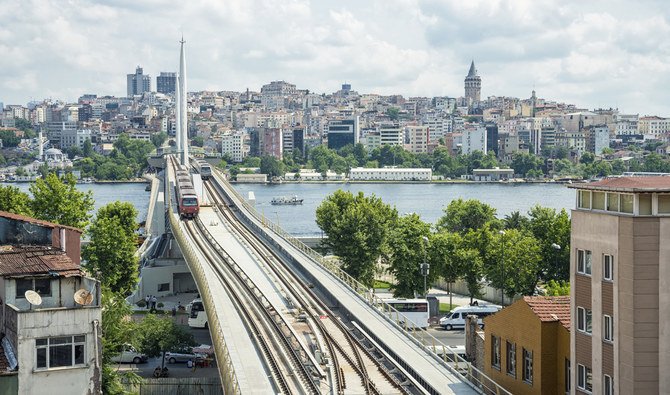ANKARA: The Turkish presidency is drafting a law that will remove power from the opposition-held Istanbul metropolitan municipality. Many suspect that the motive behind the legislation is retaliation against Istanbul Mayor Ekrem Imamoglu, the Nation Alliance candidate who won office in a landslide victory in June against Binali Yildirim, the candidate from the ruling Justice and Development Party (AKP).
According to local press reports, the new law — currently being prepared by the Ministry of Environment and Urban Planning — will shift jurisdiction over development along the Bosporus from the Istanbul metropolitan municipality to a “Bosporus presidency” whose members will be appointed by President Recep Tayyip Erdogan, and will also restrict the municipality’s power to make amendments to development plans in the city, allowing the Bosporus presidency to assign the city’s “green areas” — effectively allowing it to decide where construction can or cannot take place in Istanbul.
“The unilateral transfer of powers to the presidency illustrates just how imbalanced Turkey’s division of power is,” Nate Schenkkan, director for special research at US NGO Freedom House, told Arab News.
Turkey’s once-booming construction sector, which is seen by many as one of the main factors behind the AKP’s uninterrupted electoral success, has come to a grinding halt in recent months, mainly due to the collapse of the Turkish currency. A number of planned urban-redevelopment projects, slated to run into billions of dollars, are now in need of government subsidies to remain viable.
For 2019, Erdogan had promised to start the construction of a 43-km canal near Istanbul, along with a number of new towns along its banks. The opening of Istanbul airport last year was also seen as a megaproject intended to back the ailing construction sector.
Supporters of the new draft law say it will resolve confusion about overlapping authorities and help combat illegal housing in the city.
But Imamoglu has strongly criticized the draft law, telling Euronews that the municipality will “claim its rights” if the law passes.
Schenkkan believes that is likely. “The judicial system is also under strong presidential influence, which grows by the month as the president has more opportunities for appointments,” he said. “So successfully challenging (it) in the courts is a difficult task.
“Under the new constitution, the president can essentially transfer powers to himself and then dare other institutions to have it overturned in the courts. Combined with the continued use of trustees to replace mayors in the southeast, this shows the limits of the opposition’s success at the local level in this year’s elections,” he continued.
In mid-August, trustees were appointed to four pro-Kurdish HDP municipalities in Turkey’s southeast, because of the areas’ alleged links to terrorism. The mayors of Diyarbakir, Mardin and Van, all from the HDP, were suspended over suspected terror links, and there is mounting speculation that Imamoglu could also be removed from office.
According to Seren Selvin Korkmaz, cofounder and executive director of the independent IstanPol Institute in Istanbul, the government’s attempts to centralize power and remove responsibilities from local municipalities is typical of the AKP.
“The ruling AKP has followed a neo-liberal populist agenda combined with increasing nepotism and clientelism,” she told Arab News. “It is (obvious) that the loss of major cities including Istanbul, Ankara, and İzmir is a major blow for AKP’s rent-seeking economy.”
Korkmaz also added that the ruling party had been in charge of the country’s largest cities and central government for almost two decades, and had used urban space and municipality services to establish rent mechanisms that best suited it.
“Commodification of land, urban transformation projects and clientelist redistribution mechanisms created a chain of patronage relationships which ensure continuous support (for the AKP),” she said, adding that the AKP’s losses in recent local elections meant that chain’s “flawless mechanism” had been broken.
Korkmaz said that while the Bosphorus area is clearly an attractive proposition for developers looking to construct high-yield rental accommodation, the government’s plans could backfire if it continues to remove power from local non-AKP authorities — a move that could strengthen the opposition’s “victimized position” and unite supporters of the opposition parties.
“That always has the potential to turn the vote in Turkish politics,” she said. “Also, it may compel the opposition to be more creative in its strategies for reaching voters.”
Source: Arab News



